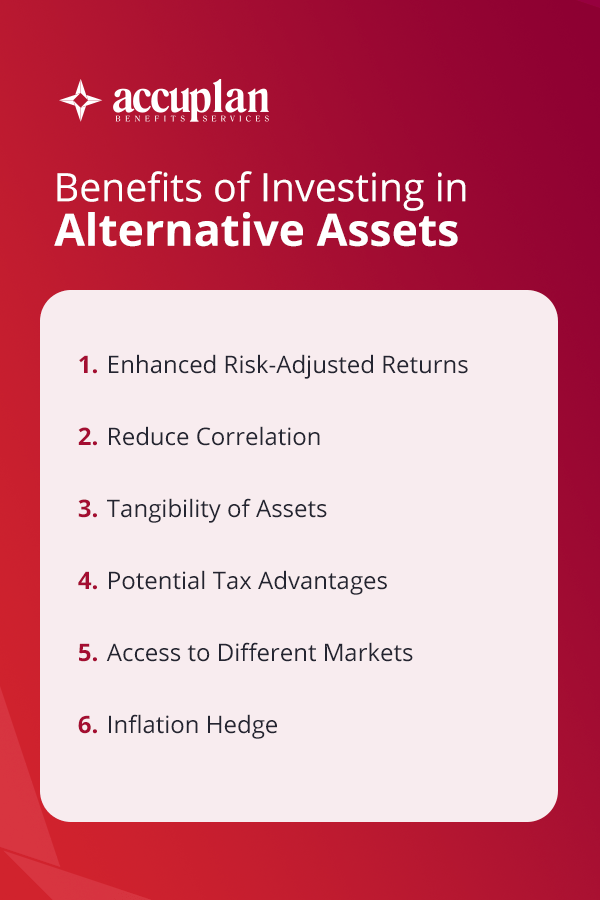
Investors today are increasingly turning to alternative assets to diversify their portfolios and enhance returns. But what are they, and how do they work? Are there any risks? If yes, how do you navigate them?
This guide defines alternative investments and addresses other key considerations. At Accuplan Benefits Services, we help people integrate alternative assets into their investment strategy for a more robust financial future. You can achieve this with a self-directed individual retirement account (IRA), which provides options beyond traditional assets and greater control.
What Are Alternative Assets?
An alternative asset is an investment that exists outside traditional investment categories such as stocks, bonds, or cash. You can still use an alternative investment to contribute to traditional investments, but unconventionally, like shorting or arbitraging a stock between two different markets. From cryptocurrency to antiques to film production, various assets fall under the larger umbrella of alternative investments.
Alternative investments can generate large returns, but they also carry significant risks. Despite being subject to the Dodd-Frank Wall Street Reform and Consumer Protection Act and modernization attempts, alternative investments, as well as the financial advisors who manage them, are not as well-defined or heavily regulated by the United States Securities and Exchange Commission (SEC) as traditional investments. This lack of oversight makes alternative investments more susceptible to scams, fraud and suspicious activity.
For this reason, access to alternative investments has historically been limited to extremely wealthy individuals. They afford to make a significant upfront investment, and their finances can afford to take a hit if the investment fails. However, due to more opportunities for investors to take control of their finances, alternative investments are less risky and more accessible to more people now than ever before.
The Differences Between Alternative and Traditional Assets
Traditional and alternative investments differ in several key aspects. They have varying characteristics, risk profiles and liquidity. Here is a breakdown of the main distinguishing features:

1. Asset Classes
Traditional investments include stocks, bonds, cash and cash equivalents. These options are usually traded on public markets and have been the most recognized forms of investment for years. Traditional assets are included in standard investment portfolios.
Alternative assets encompass a broader range of assets, including real estate, commodities, private equity, hedge funds, art, collectibles and cryptocurrencies. They are typically excluded from conventional investment portfolios.
2. Liquidity
Generally, you can buy stocks, bonds and other traditional assets quickly on exchanges, making them highly liquid. On the contrary, most alternative assets have lower liquidity. For example, real estate and private equity investments may require significant time to sell or restrictions on when they can be sold.
3. Transparency
Traditional investments are usually more transparent, with readily available data on market performance, valuations and regulatory oversight. In contrast, alternative investments often lack the same level of transparency. Valuations may be subjective, and information on performance may not be readily accessible.
4. Regulatory Oversight
Traditional investments are regulated by various bodies, depending on the type of asset or industry. These regulatory bodies include the SEC, Federal Deposit Insurance Corporation (FDIC), Federal Reserve Board (FRB) and Financial Conduct Authority (FCA). Most alternative assets are not subject to these strict regulations.
5. Risk and Return Profile
Traditional investments are generally considered less risky. Return generally is more predictable, especially in the case of bonds. Stocks can be volatile, but they have a long history of providing positive returns over the long term. Alternative assets tend to carry higher risks and can be more volatile. However, they may also offer the potential for higher returns, especially in niche markets or during certain economic conditions.
6. Investment Horizon
Traditional investments are often suitable for both short-term and long-term investments, allowing for flexibility in investment strategy. Alternative investments typically require a longer investment horizon, especially for assets like private equity or real estate, which may take years to realize returns.
7. Diversification Benefits
Traditional investments are limited to options like stock, bonds and cash. However, alternative investments offer a wider range of investment options, allowing you to diversify your portfolio. Investment diversification can help mitigate market and economic risks.
Benefits of Investing in Alternative Assets

Despite some of the risks they pose, alternative investments are an increasingly attractive option for many investors. They are a great way to diversify your financial portfolio, providing many benefits:
1. Enhanced Risk-Adjusted Returns
Diversification mitigates risks and increases the stability of all your investments. If one of your investments performs poorly or fails, you still have other accounts to fall back on. Investing in alternative assets can help you achieve a more favorable risk-return profile.
2. Reduce Correlation
While it’s important to diversify your portfolio of traditional investments, taking it a step further with an alternative investment provides an additional layer of security to your finances. Alternative investments are not tied to and do not correlate with the stock market or the current value of cash. They hold their value, helping protect you and your finances from stock market volatility and major economic downturns.
3. Tangibility of Assets
Additionally, there are more concrete benefits associated with alternative investments. Some alternative investments, such as collectible items and real estate, are tangible, meaning that you have direct ownership over an actual asset. This can provide a sense of security and diversification beyond purely financial investments.
4. Potential Tax Advantages
You may enjoy significant tax benefits depending on what you invest in. It’s hard to avoid paying taxes on traditional investments, but alternative investments are not subject to the same tax regulations. In some cases, you may be eligible for certain tax breaks. It can be easier to get the most out of your investment.
5. Access to Different Markets
Alternative investment provides exposure to various markets and sectors not readily accessible through traditional investments. For example, you can invest in real estate, private equity and commodities. Moreover, incorporating alternative assets allows for a more strategic asset allocation approach. You can tailor portfolios to specific risk tolerances, investment goals and market conditions.
6. Inflation Hedge
Many alternative assets, like real estate and commodities, can serve as a hedge against inflation. This is particularly important in rising prices, as these assets may retain or even increase their value.
How Alternative Investments Work
Alternative investments refer to many different kinds of investment opportunities and strategies. There’s no single way to explain how they work, and the process can vary significantly between investments. It’s crucial to research before making any alternative investment to understand how it works, what risks you’re taking on and how you can benefit from it.
If you have the funds available, you can make a new investment that works for your financial situation and helps you meet your goals. Starting fresh with a new investment lets you go about it properly from the start. Making an alternative investment with your available funds is a particularly smart idea if you’ve already pursued more traditional investment avenues.
You may also be able to convert investments you already have into an alternative investment — retirement accounts are often used for this purpose. Depending on your retirement account, you may be able to roll it over into a new investment. IRAs tend to offer the most flexibility, as, unlike employer-based retirement accounts, you can use an IRA to invest in a way that makes sense for you. If you have a health savings account (HSA), you may be able to use it similarly.
Alternative Asset Management
Managing alternative investments involves several steps, which can vary depending on the type of asset or investment strategy. Here’s a general overview of the process:
- Investment strategy development: Define the investment strategy based on market analysis, risk tolerance and investment objectives. This process may involve deciding on specific sectors, such as private equity or real estate, or investment strategies, such as short-term or long-term equity or distressed assets.
- Source investments: Seek opportunities to invest in alternative assets. For example, consider networking or leveraging industry connections to identify potential investments. Consulting an investment broker is also a good idea.
- Due diligence: After identifying the prospective investment option, conduct thorough due diligence. Different types of due diligence are used, including financial and legal due diligence. This process is critical in alternative investments due to their complexity and potential risks.
- Investment execution: You can proceed once the investment opportunity is deemed viable. At this stage, you negotiate terms, structure deals and ensure compliance with legal and regulatory requirements.
- Monitoring and management: Continue monitoring the investment after acquisition. It’s crucial to track performance, assess market changes and adjust strategies as needed.
- Exit strategy: Developing an exit strategy is a vital aspect of alternative investment management. This involves developing a plan for how and when to sell the investment, such as selling to other investors. Exit strategies allow you to maximize potential returns while reducing losses.
Common Types of Alternative Assets
While it’s essential to learn the general alternative investment strategies, knowing the various types of assets and how they function is also helpful. Below are some of the most common options available to investors:
1. Real Estate
Owning any residential or commercial property is considered an alternative investment. If you own your home, you are a real estate investor. Because homeownership is a popular financial goal, real estate is likely the most common alternative investment that many people make.
Aside from owning your own house, there are a few different ways to invest in real estate. You can always look into renting out a second property, but if you aren’t interested in being a property manager, you may want to consider investing in a real estate investment trust (REIT). REITs purchase and operate income-producing properties to keep them part of their investment portfolio rather than to resell them. You can also spread your investment over different properties to further reduce risk.
You can open a self-directed real estate IRA if you don’t want to invest in a large company or prefer more control over your investment. You won’t technically own the property—the IRA will—and can’t use it yourself, but any income it generates will go straight into your retirement account. You have to follow fairly strict rules when buying real estate with your IRA, but you stand to see a large return if the value of your property appreciates or you choose to sell it.
2. Precious Metals
Gold, silver, platinum, palladium and other precious metals are popular investments. Many still regard them as the gold standard of alternative investment options. Unlike real estate, they aren’t necessarily used as a source of passive income. Instead, precious metals are used to protect against inflation and economic instability. Though traditional investments tend to lose their value during inflation, precious metals tend to remain stable, if not increase, in value. After all, they have intrinsic value as an asset, and because they are limited resources, they cannot be inflated.
You don’t need to find stacks of gold bars or piles of silver coins—there are several different ways you can invest in precious metals. If you want to own them outright, you can purchase a certificate representing your ownership, which saves you the hassle of securing and storing physical assets. You can also look into gold exchange-traded funds (ETF) and stock options to invest in companies that mine and trade precious metals rather than directly into metals themselves.
Another option is to use your retirement account to purchase precious metals, though you’ll need a gold IRA. Gold IRAs are heavily regulated and can be challenging to open if you aren’t knowledgeable about the process. However, it’s worth finding a financial expert to assist you, as it can help secure your retirement.
3. Private Equity
Private equity involves investing in companies that are not publicly traded. This encompasses many kinds of investments, from providing venture capital for startups to funding buyouts of entire organizations.
While you can invest directly into a company, these investments are typically made through a private equity firm. Initial investments can be costly, but they may outperform investments in publicly traded companies. There is often more risk involved, but you stand to make a great return on your investment. Private equity EFTs and funds of funds offer a lower investment threshold but may require additional fees and expenses.
You can use your cash to make a private equity investment if you have the funds available. Retirement accounts are another common way to invest in private equity. If you have an employer-backed 401(k), you may already have done so, but if you want more control, you can also use a self-directed IRA to make and manage private equity investments. While profitable, this option is ideal for long-term investments.
4. Hedge Funds
A hedge fund uses investments from many different people and employs nontraditional strategies to maximize returns on those investments. It is similar to mutual funds but tends to only be accessible to high-net-worth individuals. Common strategies for hedge fund investments include arbitrage and shorting stocks, but the actual investment strategy can vary greatly depending on who is managing the fund.
Hedge funds attempt to protect against market shifts. Some managers take an all-weather approach to investing to guarantee returns, regardless of how the market or economy as a whole is performing. They are often more fast-paced and liquid than other alternative investments, meaning that you can benefit from your investment more quickly.
5. Collectibles
Collectibles refer to items that increase in value due to popularity, age, novelty, or rarity. Popular collectible items include wine, fine art, baseball cards, classic cars, stamps, coins, antiques and jewelry.
This may sound like a more whimsical or fun investment, but you must take care of collectibles. Acquiring and storing them can be challenging, and they aren’t as liquid as other investments. Collectibles also don’t bring in income until you sell them. While you can likely sell them for a significant profit, it can be tricky to find the right buyer. If you’re already highly knowledgeable or passionate about a certain kind of collectible, though, you may enjoy the process of collecting and set yourself up to reap its rewards when the time is right.
6. Cryptocurrencies
Cryptocurrency has emerged as a popular alternative investment asset due to its unique characteristics. These digital assets operate on blockchain technology, offering decentralization, transparency and security. Investors are attracted to cryptocurrencies for their potential high returns, diversification benefits and exposure to innovative technology. However, the volatile nature of the crypto market poses significant risks, including price fluctuations, regulatory uncertainty and security concerns.
Despite these risks, some investors view cryptocurrencies as a hedge against inflation and a store of value. Proper due diligence, risk management and a long-term investment horizon are essential when considering cryptocurrencies as an alternative asset in a diversified portfolio. Consulting with a financial advisor can help investors navigate the complexities of this evolving asset class effectively.

Identifying and Mitigating Alternative Asset Risks
Investing in alternative assets can offer significant rewards but also comes with risks. These include:
- Illiquidity risk: It could be challenging to convert alternative investments like private equity and real estate into cash or sell them.
- Market risk: Broader market conditions, such as economic downturns and changes in interest rates, can affect alternative investments.
- Operational risk: Improper management, such as failures in internal systems, can impact alternative investments.
- Regulatory risk: Changes in laws can impact alternative investments, particularly in sectors like cryptocurrency and real estate.
- Valuation risk: Alternative assets often lack transparent pricing mechanisms, making it challenging to assess their true value.
To navigate these challenges, it is crucial to consider the following:
- Diversification: Spreading investments across various alternative asset classes can reduce risk.
- Due diligence: Conducting thorough research before investing is essential.
- Hedging: Use financial instruments, such as options or futures, to hedge against potential losses in alternative assets.
- Monitoring and rebalancing: Regularly review the performance of alternative investments and adjust the portfolio as needed.
Investing in Alternative Assets With Self-Directed IRA
Self-directed IRAs offer greater flexibility and control over retirement savings, mainly when investing in alternative assets, Here are some key benefits:
- Increased investment options: Self-directed IRAs allow you to diversify your portfolio by including a wide range of alternative assets.
- Greater control: You can tailor your investment strategies to align with your financial goals and risk tolerance.
- Tax advantages: Earnings can grow tax-deferred or tax-deferred depending on the type of IRA.
It’s crucial to understand the tax implications when investing in alternative assets, including the following:
- Tax-deferred status: Investments held within an SDIRA are not subject to immediate capital gains taxes until funds are withdrawn. This allows for more significant compounding growth over time.
- Unrelated business taxable income (UBTI): Certain alternative investments, such as private equity or limited partnerships, may generate UBTI, which could lead to tax liabilities within the IRA. It’s essential to understand the tax implications of specific investments to avoid unexpected tax burdens.
- Prohibited transactions: Be cautious to avoid prohibited transactions, which can lead to penalties and the potential disqualification of the IRA. Common prohibited transactions include self-dealing, such as purchasing property for personal use or engaging in transactions with disqualified persons, such as family members.
With all these considerations, partnering with a trusted professional is best.
Start Investing in Alternative Assets With Accuplan Benefits Services
Understanding the meaning of alternative investment and the various strategies is crucial for maximizing your retirement savings. If you are ready to explore these options, contact Accuplan Benefits Services today!
We can help you invest in alternative assets through self-directed IRAs. Discover the benefits of diversifying your portfolio with real estate, cryptocurrencies and more — all while enjoying tax advantages. Don’t miss out on unique opportunities!

Our information shouldn’t be relied upon for investment advice but simply for information and educational purposes only. It is not intended to provide, nor should it be relied upon for accounting, legal, tax or investment advice.